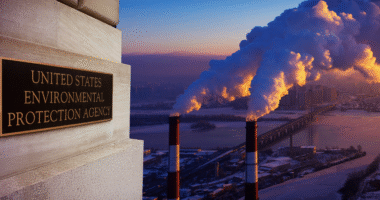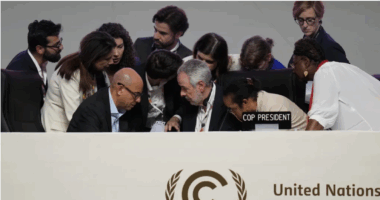Climate, Health and Equity Brief
EPA denial, food insecurity, and kids in the ER
August 1, 2025

The Climate, Health & Equity Brief is GMMB’s take on the latest news on the current impacts of climate change. If you haven’t subscribed yet, you can do so by clicking here.
Hot Topic: Food futures. Mr. Trump’s EPA unveiled plans this week to revoke the landmark “endangerment finding”—the key scientific rule that gives the government the power to limit fossil fuel pollution. The move amounts to an outright rejection of the scientific consensus that greenhouse gases endanger public health, and it threatens to erase emissions limits from cars, power plants, and other pollution sources.
A 45-day public comment period on the proposal will soon begin. Once the EPA issues the final rule, lawsuits are certain to follow—and the matter will ultimately be decided in court. If ultimately upheld, it could make it significantly harder for future administrations to limit the burning of coal, oil and gas.
Against this backdrop of regulatory retreat, new research and international reports make clear: climate change is fueling a global food crisis, with droughts, heatwaves, and rising prices undermining nutrition and pushing millions further into hunger.
A study released ahead of this week’s UN Food Systems Summit links climate-driven droughts, floods, and heatwaves to rising global food prices. In just one recent example, persistent droughts followed by record heat across Ghana and the Ivory Coast—where 60% of the world’s cocoa is grown—recently triggered a staggering 300% spike in cocoa prices.
The UN’s State of Food Security and Nutrition in the World report for 2025, released this week, underscores the scale of the crisis. Since 2020, food price inflation has outpaced overall inflation in nearly every region. From 2019 to 2025, 139 countries experienced food price increases above 25%, with 49 seeing spikes of more than 50%. And the report makes clear: climate change is now a central driver of rising prices and worsening hunger, especially for the world’s most vulnerable.
The UN reports 66.6% of Africa’s population—more than double the global average of 31.9%—cannot afford a healthy diet. And the International Energy Agency estimates that despite progress, 2 billion people globally still rely on polluting fuels for cooking, contributing to 815,000 premature deaths each year.
Adding to these threats, new research from the Society for Experimental Biology finds that rising temperatures and CO₂ levels are eroding the nutritional quality of leafy greens like spinach, kale, and arugula—reducing their content of vital nutrients like iron, magnesium, and protein, especially when increased heat and CO₂ levels are combined.
Last year, the IEA rallied governments and funders to pledge $2.2 billion for clean cooking in Africa, marking an unprecedented global push to accelerate progress. Yet in many other cases, interventions remain largely underfunded and politically sidelined. As the U.S. retreats, climate shocks intensify and inequality deepens, inaction is becoming its own form of policy—one with consequences far beyond the dinner table.
Human Health
Preliminary research indicates that rising atmospheric CO₂ and higher temperatures significantly reduce the nutritional quality of leafy vegetables, with serious implications for human nutrition and health. (Phys.org)
A new study warns that climate change is increasing the risk of pandemics by making 9% of Earth’s land—home to 130 million people—highly vulnerable to outbreaks of zoonotic diseases like Ebola, Zika, and SARS. (Carbon Brief)
A study of 11 years of California emergency room data shows that as temperatures rise, ER visits increase—especially among children under five, who visit at higher rates than any other age group. (The Washington Post)
Planetary Health
A new study finds that wildfires have surpassed logging and agriculture as the top threat to forests’ ability to absorb carbon, with global forests soaking up just a quarter as much CO₂ in 2023 and 2024 as they did in the early 2000s. (The New York Times)
A separate new study finds that extreme fire weather nearly doubled the amount of forest canopy lost to fire worldwide in 2023 and 2024, the hottest years on record, with North American forests losing nearly four times as much as in previous decades. (The New York Times)
New research analyzing two decades of NASA satellite data reveals that Earth’s continents are losing fresh water at an unprecedented rate due to climate change and poor groundwater management, with 75% of the world’s population living in areas facing growing risks to water and food security. (Space)
Equity
A new study links extreme weather with rising food costs and warns that climate-fueled price shocks are exacerbating global health and equity disparities, with the poorest communities facing heightened risks of malnutrition and food insecurity. (The Guardian)
Despite global progress, four in five households in sub-Saharan Africa still cook with polluting fuels, contributing to 815,000 premature deaths each year—a crisis now targeted by new government policies and $2.2 billion in investments coordinated by the International Energy Agency. (Axios)
Despite the Basel Convention classifying mixed plastic waste as hazardous, wealthy nations continue to export plastic-laden ‘refuse-derived fuel‘ (RDF) to poorer countries to be burned—exploiting legal loopholes to offload toxic, climate-harming waste in what environmental advocates call “waste colonialism.” (Grist)
NOAA and the National Weather Service warn that Southern Black communities in the U.S. face nearly double the flood exposure of other groups due to racial and infrastructural inequities that leave them vulnerable to growing flood threats. (Capital B)
Politics & Economy
Administration Watch:
- Mr. Trump’s EPA is proposing to revoke the landmark “endangerment finding” that underpins federal greenhouse gas regulations—marking a shift toward outright climate science denial and threatening to dismantle emissions rules for cars, power plants, and other major polluters. (The New York Times)
- The Trump administration has backed away from plans to abolish FEMA outright, instead moving toward a “rebranding” that emphasizes state rather than federal disaster response leadership. (The Washington Post)
- The Trump administration has suspended work on a groundbreaking NOAA tool that would have predicted how climate change will intensify rainfall across the U.S., leaving communities without vital data as storms and flood risks intensify. (The Washington Post)
- The EPA eliminated its Office of Research and Development, which studied hazardous chemicals, environmental threats, and their impact on humans and the environment. (The Washington Post)
- The EPA has delayed enforcement of a Biden-era rule to limit methane emissions from oil and gas drilling, granting companies another 18 months to comply as they consider eliminating the rule entirely. (The Hill)
- The USDA abruptly closed the July 1 application window for the Rural Energy for America Program (REAP), which provides grants to help farmers install solar panels and other energy-efficient projects. (Grist)
China and the EU have pledged to step up their cooperation on emissions cuts and clean energy, sending a “much-needed signal” of leadership as the U.S. retreats from climate commitments. (The New York Times)
Multiple scientists say that the Trump administration’s new climate report “fundamentally misrepresents” their research—by cherry-picking data, omitting context, and drawing debunked conclusions—in the publication now being used to justify major rollbacks of U.S. climate regulations. (Wired)
Twenty states have united to sue the Trump administration for ending FEMA’s $4.5 billion Building Resilient Infrastructures and Communities (BRIC) program, arguing the move was unlawful, jeopardizes hundreds of infrastructure projects nationwide, and increases Americans’ risk from natural disasters. (The Hill)
House Republicans have slashed U.S. funding for the Montreal Protocol’s international aid fund—the Reagan-era treaty credited with saving the ozone layer—risking the effectiveness of a landmark environmental agreement as part of broader GOP spending cuts now heading to President Trump’s desk. (POLITICO)
The Inflation Reduction Act spurred record growth in U.S. solar, battery, and electric vehicle deployment in early 2025, but with President Trump rolling back incentives and enacting new restrictions, experts warn the recent U.S. clean energy boom is set to slow significantly. (E&E News)
In a landmark advisory opinion, the International Court of Justice has ruled that countries can sue each other over climate change harms—including historic emissions—paving the way for vulnerable nations to seek compensation, though proving responsibility will be complex and the ruling is not legally binding. (BBC)
Texas officials, led by Attorney General Ken Paxton, are weaponizing state laws to threaten lawsuits and blacklist banks found to be “discriminatory to the fossil fuel industry”—pushing major financial institutions to abandon the Net-Zero Banking Alliance and scale back public climate goals. (Rolling Stone via Yahoo News)
A 68-country study finds that simply experiencing extreme weather does not make people more likely to support climate action—but when people understand the link between climate change and those events, their support for climate policies increases significantly. (Word In Black)
Action
Musicians and music venues are confronting live music’s climate toll by slashing tour emissions, promoting public transit, and inspiring climate action among fans, as new data show that fan travel generates 38 times more emissions than the shows themselves. (Grist)
Life as We Know It
As summer temperatures rise, scientists warn that FIFA may need to move the World Cup tournaments from the June-July schedule to protect players and fans from severe heat-related health risks. (AP News)
Tourist hotspots across Europe are facing a tourism crisis as record heat, eroding coastlines, and extreme weather drive travelers away and force the tourism industry to face an uncertain future. (Travel and Tour World)
Kicker
Ever wonder how communities across the country are taking climate action? Check out the local climate solutions submitted to The New York Times by their readers.
“Climate chaos means hunger for millions.”
-António Guterres, United Nations Secretary-General
The GMMB Climate, Health & Equity Brief would not be possible without the contributions of the larger GMMB team—Catherine Ahmad, Stefana Hendronetto, Nikki Melamed, Sharde Olabanji, Kenzie Perrow, Krishna Rajpara, and Marci Welford. Feedback on the Brief is welcome and encouraged and should be sent to [email protected].




